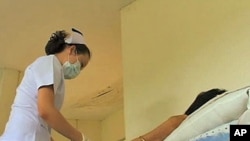Many HIV-infected patients have adverse reactions to anti-retroviral drugs, and others fail to take the drugs properly, which means resistance to the drugs may increase. In Thailand, the government plans to provide free DNA testing to screen for adverse reactions, to help reduce the threat of resistance.
One man in Bangkok had adverse reaction to an antiretroviral drug used to delay the onset of AIDS. He panicked, he said, when a rash turned his body red.
What worries experts is that such reactions force patients to stop treatment, creating the risk that they will develop resistance to the most effective and affordable HIV drugs.
In Thailand, Mahidol University's Wasun Chantratita studies DNA samples of HIV patients with adverse reactions to the antiretroviral drugs or ARVs. ARVs put pressure on the virus when taken as scheduled. But easing that pressure by pausing treatment means resistant cells may be able to replicate faster. Wasun said missing just two or three treatments can cause resistance.
"The resistance, when it happens, it means the medication can no longer control the virus," said Wasun.
Thailand has a very low resistance rate of about 2 percent, compared with 10 percent in some other countries. Laura Birmingham is the World Health Organization representative here. "But it's very important because you have 216,000 people on medicine and we would like to keep them on the first line of regimen as long as possible, not only for their own sake - it's a simpler regimen to take - but also because of the cost implication."
Thailand, like some other countries, manufactures generic versions of ARVs. That enables the government to provide free ARV treatment, using the so-called first-line drugs, at a cost of about $450 a year per patient.
"If they resist to the first-line regimen, then we have to use the second-line which cost two to nine times higher than [we pay] right now," said Wasun.
Thai health professionals recently sought help from international experts on stemming adverse reactions and resistance to keep affordable generics useful for a longer time.
Professor Chen Yuan-Tsong of Taiwan's Academia Sinica helped discover DNA markers that can tell if a person will develop an adverse reaction. "We are all different. And one person is more sensitive to one particular drug than others. This is because of genetic makeup. Once you figure out what is this genetic makeup, then you can do the screening."
Screening patients' DNA enables doctors to avoid prescribing drugs that will cause a reaction.
Technicians at Mahidol University are testing a small device that can detect sensitivity to an ARV. They hope to bring this screening technology to hospitals and clinics in the countryside.
